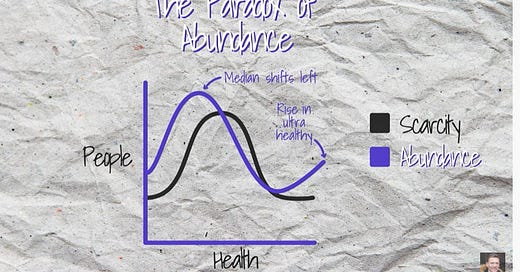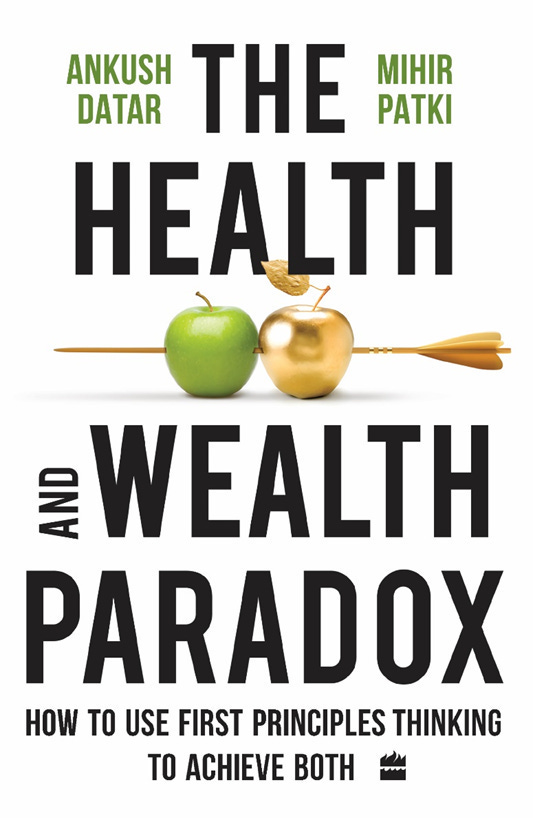"There are no solutions, only trade-offs"
Understanding the costs of trade-offs in life, investing, relationships and health
If you’re reading this blog post right now, it means you’ve chosen to spend your time here over countless other valuable things you could be doing. For that, I truly thank you.
Every single decision we make in life comes at the cost of another—a trade-off.
As an investor, I’ve come to understand the significance of trade-offs over my experience. These patterns aren’t just confined to finance; they extend into every aspect of life.
Trade-offs arise from both our actions and those we avoid.
In today’s piece, I reflect on simple trade-offs across different facets of my life.
Investing Trade-Offs
In layman's terms, for nonfinancial individuals, when you invest in one sector or stock you have to be willing to sacrifice returns from some other sector or stock.
Let me explain this with a simple chart comparing Investor A and Investor B
Each investor invests Rs 100 and distributes that money across various sectors in the proportions defined by their analysis.
A is a more balanced investor preferring to invest equally across sectors while B is a more aggressive investor who takes more concentrated bets on certain sectors
Investor B earned a much lower return by making a trade-off: increasing the weightage in certain sectors he was more confident about. This trade-off backfired for him, though it could have always gone another way.
There will always be trade-offs that an investor must bear throughout his investing journey and that is inevitable.
Investor A understood the trade-off involved in taking a bet on a riskier sector, which could possibly lead to the erosion of his investment, as it did for Investor B. It was a fair analysis of the trade-off he was willing to make between taking risks or maintaining his capital.
Career Trade-Offs
Spending more time to earn more is a trade-off we make with the time spent with our family and friends.
This is not inherently good or bad; it needs to be weighed against our life goals and priorities.
If you are working a 16-hour job at a reputed firm in a senior position, the trade-off for earning the big bucks is higher stress and less time spent with family.
If you are working an 8-hour job and earning less, the trade-off could be earning less but having more time for a social life.
Satisfaction with the job relates to the trade-offs we are willing to make today based on our current situation and goals.
Balancing work and personal relationships involves trade-offs between understanding our career and life goals and spending time with our life partners, clients, friends, and family.
Exercise Trade-Offs
When I am training for a long-distance marathon, I have to generally be willing to accept the trade-off of losing muscle mass to achieve that goal.
Similarly, when I am focusing on putting on muscle, I have to be willing to lose some amount of endurance while focusing on the goal of building muscle.
Life is not a free lunch where I can maximize both goals, I have to be content with the trade-off.
Nutrition Trade-Offs
If I am eating to gain weight, I have to eat in calorie surplus which implies gaining some muscle at the expense of gaining some fat. This is the short-term trade-off I have to be willing to make.
If I am eating in a calorie deficit to lose fat, the trade-off I am making is to slow down muscle growth to achieve my goal of fat-loss.
What cost am I bearing on my body by not going to the gym, or what cost is my body bearing by eating this pizza today as opposed to the plate of grilled chicken for my stated health objectives?
The phrase "There are no solutions; there are only trade-offs" is attributed to economist Thomas Sowell, particularly in his book A Conflict of Visions: Ideological Origins of Political Struggles.
This statement says that in complex decision-making, especially within economic and social policies, achieving a perfect solution is often unattainable.
Beyond policy, this applies to all aspects of our life.
Paul Graham rightly states that if you have any good ideas at all, you'll probably have more than one. There will always be opportunity cost. So you may as well learn to live with it, rather than letting it paralyze you.
Spending more time on one thing necessarily means spending less time on something else.
George A. Miller's 1956 paper, "The Magical Number Seven, Plus or Minus Two," explores the limitations of human short-term memory, suggesting that people can hold about seven (give or take two) items in their minds simultaneously.
This limitation implies that focusing on multiple tasks or pieces of information beyond this capacity can lead to decreased efficiency and increased errors. Therefore, attempting to concentrate on more than two different things simultaneously is often impractical due to these cognitive constraints.
Conclusion
Live with the decisions you make because every decision in life comes at the cost of something else.
To be happy in life and content with your decisions, you must be clear about what you want to prioritize.
At the end of the day, every trade-off we make reflects our priorities.
Relevant Reads from my blog:
Pre-Order my debut book today:





